
1 July 2024
Developed market stocks delivered strong returns in H1. But looking ahead, a key question for investors is whether valuations are overstretched, and whether future returns could suffer as a result.
By rights, the US dollar should have weakened through June. US activity data have been surprising meaningfully to the downside, which, combined with soft May inflation readings, has meant that US yields have declined relative to yields elsewhere. Yet the dollar has gained ground.
There are a number of reasons for investors to remain optimistic in H2. We’re already seeing a pick-up in the global earnings outlook. But geopolitical and election uncertainty are likely to be top of mind in the coming months, and could unsettle markets.
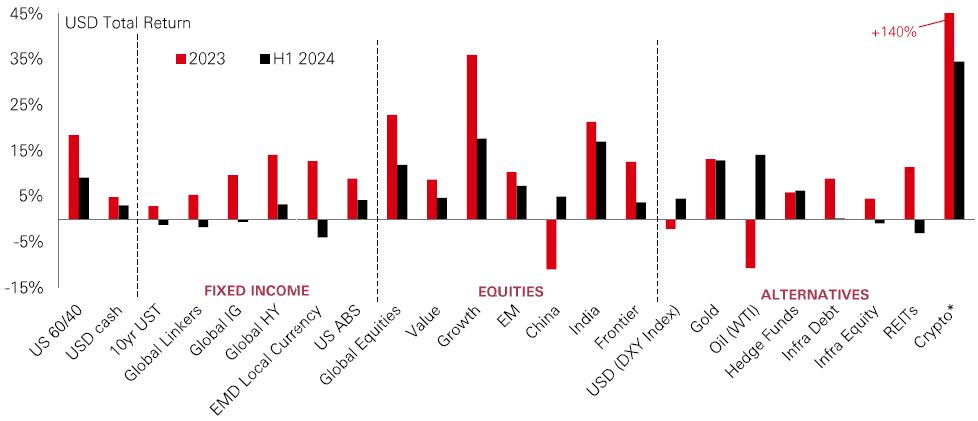
What’s next for investment markets in the second half of the year? A good starting point is to reflect on where we have come from. And 2024 has had already seen some economic and market twists and turns.
The resetting of 2024 policy rate expectations (from 7 Fed cuts to only 1-2) was the big economic event during H1. This damaged core fixed income returns. But shorter duration credits – like High Yield or ABS – fared better. Meanwhile macro resilience and the AI megatrend helped global stocks to keep on going. Value stocks couldn’t keep pace with Growth, but still managed to deliver returns (on an annualised basis) at a similar clip to 2023.
Yet the headlines mask important nuances. Strength in developed market stocks was broad-based in Q1, but performance has been more varied during Q2, with tech performing well. Likewise, Treasury bond yields rose through to late April, thanks to hot growth and inflation prints. But, since then, signs that growth is slowing and inflation unsticking itself have driven a bond rally. In investing, both the destination and the journey are important.
So, what do these trends tell us about the near-term future? Well, after a tricky start to 2024, we see a return for fixed income. For credits and stocks, a more selective approach looks warranted. Areas like infrastructure and real estate are unloved and typically defensive. Japan still looks interesting. And don’t overlook opportunities to “play the yield” especially in Asia. South Asia, after all, remains the fastest growing region in 2024.
Asia has been the best performing EM region in the first half of the year. The recovery in Chinese stocks accelerated in Q2 with investor confidence boosted by stabilising profits and policy initiatives. Elsewhere, India has seen strong returns again in 2024 – with MSCI India delivering comparable performance to the S&P500.
Latin America – the winning region in 2023 – has struggled in 2024. Stocks have both performed negatively, despite both Brazil and Mexico cutting interest rates. An interesting theme for US and European investors to mull over.
A third lesson from emerging market investing in H1 has been connected to how election uncertainty transmits to market price action. Polling results in India in June created short-lived stock and FX volatility, but the market quickly recovered as investors refocussed on a consistent policy agenda and the exciting Indian megatrends. But in Mexico, the peso has sustained a double-digit percent drawdown following the election result. For investors, it’s not just news and events that matter for market direction, but how traders’ expectations are set ahead of that news.
The value of investments and any income from them can go down as well as up and investors may not get back the amount originally invested. Past performance does not predict future returns. The level of yield is not guaranteed and may rise or fall in the future.
This information shouldn't be considered as a recommendation to buy or sell specific sector/stocks mentioned. Any views expressed were held at the time of preparation and are subject to change without notice.
Source: HSBC Asset Management. Macrobond, Bloomberg. Data as at 11am UK time 28 June 2024.
*Note: Asset class performance is represented by different indices. US 60/40: Bloomberg EQ:FI 60:40 Index, Cash: JP Morgan Cash Index (3month), 10yr UST: ICE BofA 10yr US Treasury Index, Global Linkers: ICE BofAGlobal Inflation-Linked Government Index, Global IG: Bloomberg Barclays Global IG Total Return Index unhedged. Global High Yield Index: ICE BoFaUS High Yield Index, EMD Hard currency: US ABS: Bloomberg US ABS Floating Rate Total Return index; Bloomberg Barclays Global Aggregate Treasuries Total Return Index. EMD local currency JP Morgan EMBI Global Total Return local currency. Global Equities: MSCI ACWI Net Total Return USD Index. Value: MSCI Value Index, Growth: MSCI Growth Index, Global Emerging Market Equities: MSCI Emerging Market Net Total Return USD Index. China: MSCI China Index, India: MSCI India Index. Frontier: MSCI Frontier Markets Total Return Index, Alternatives: USD: DXY Index, Gold Spot $/OZ, Oil: WTI crude oil, Hedge funds: Credit Suisse Hedge Fund Index, Leverage Loans: JP Morgan liquid Loan Index, Infra Debt: iBoxx USD Infrastructure Total Return Index, Infra Equity: Dow Jones Brookfields Global Infrastructure Total Return Index, REITS Real Estate: FTSE EPRA/NAREIT Global Index TR USD. *Crypto: Bloomberg Galaxy Crypto Index.
Developed market stocks delivered strong returns in H1. But looking ahead, a key question for investors is whether valuations are overstretched, and whether future returns could suffer as a result.
An obvious place to start is the Info Tech and Communications Services sectors. These have been the epicentre of the AI mega-theme in equities for more than 18 months – and a prime driver of returns. IT currently trades on a forward price-earnings (PE) ratio nearly 47% above its 10-year average. Communications is 14% ahead (and even higher in the US). While these sectors could continue to perform well, rich valuations can be vulnerable to profit disappointments, especially if conditions weaken.
By contrast, some of the more defensive and rate-sensitive sectors are cheaper and could offer respite if growth starts to soften. Utilities, Staples and Real Estate trade below their 10-year average Energy is the cheapest of the lot.
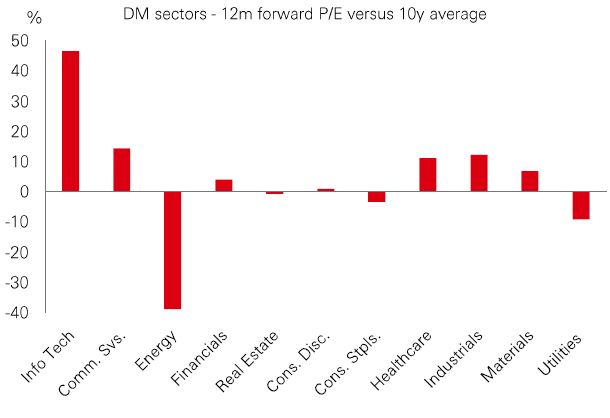
By rights, the US dollar should have weakened through June. US activity data have been surprising meaningfully to the downside, which, combined with soft May inflation readings, has meant that US yields have declined relative to yields elsewhere. Yet the dollar has gained ground.
A large part of the answer lies in what’s driving the euro, which has the largest weight in the DXY index. Idiosyncratic risks for the euro have gone up materially, reflecting political developments in France. The euro is caught up in the tussle between euro-positive moves in rate differentials and euro-negative peripheral spreads, with the latter dominating thus far.
However, if the macro undercurrents continue to evolve against the dollar, as we expect, and if the European political situation quietens down during the summer break, the recent divergence between the dollar and rates may prove temporary. Furthermore, over the medium-term, a US slowdown is likely to be more consequential for the dollar.
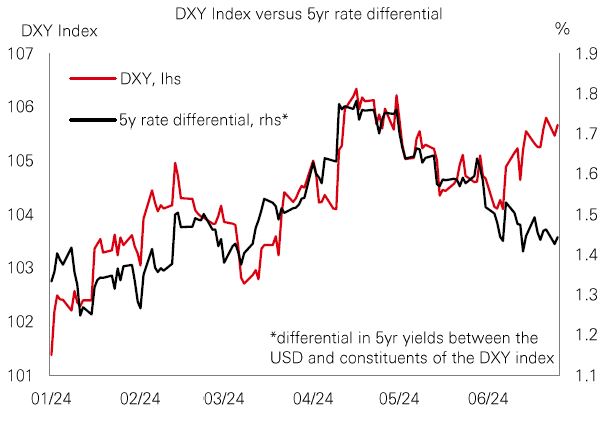
With the UEFA European Championship reaching its crucial knockout stages last weekend, some of football’s great tacticians will be looking for opportunities in attack and ways to soak up pressure in defence. This can be taken as an inspiration for some of our latest thinking on investment markets in the second half of this year.
There are a number of reasons for investors to remain optimistic in H2. As the ‘reds’ show, a solid back line of broadening growth, a return to disinflation and expected central bank policy easing offer confidence. We’re already seeing a pick-up in the global earnings outlook. And of course, some mega-themes like technology have so far delivered star performances.
But of course, the opposition, in ‘black’, must be taken seriously. Geopolitical and election uncertainty are likely to be top of mind in the coming months, and could unsettle markets. Signs of cooling in the US and an uncertain growth outlook for Asia and Europe also demand caution. And of course, any mis-steps at the policy level could put markets on the back foot too.
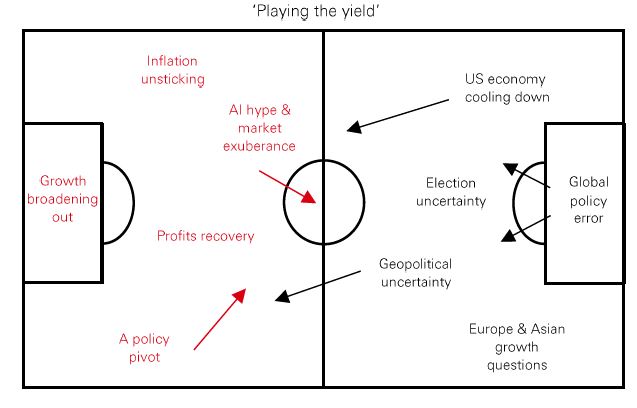
Past performance does not predict future returns. The level of yield is not guaranteed and may rise or fall in the future.
Source: HSBC Asset Management. Macrobond, Bloomberg. Data as at 11am UK time 28 June 2024.
| Last week |
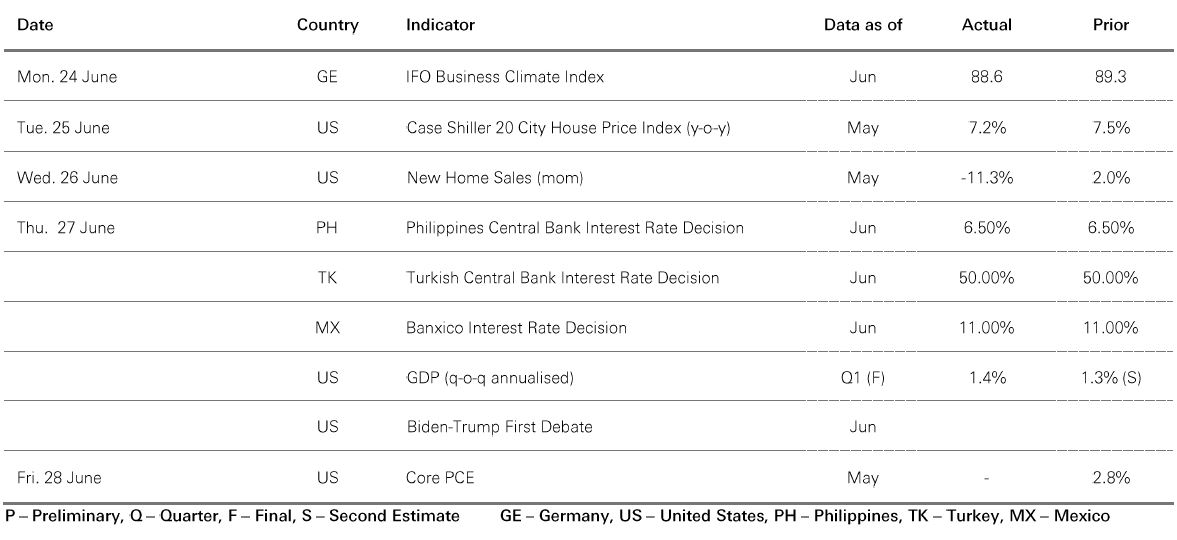
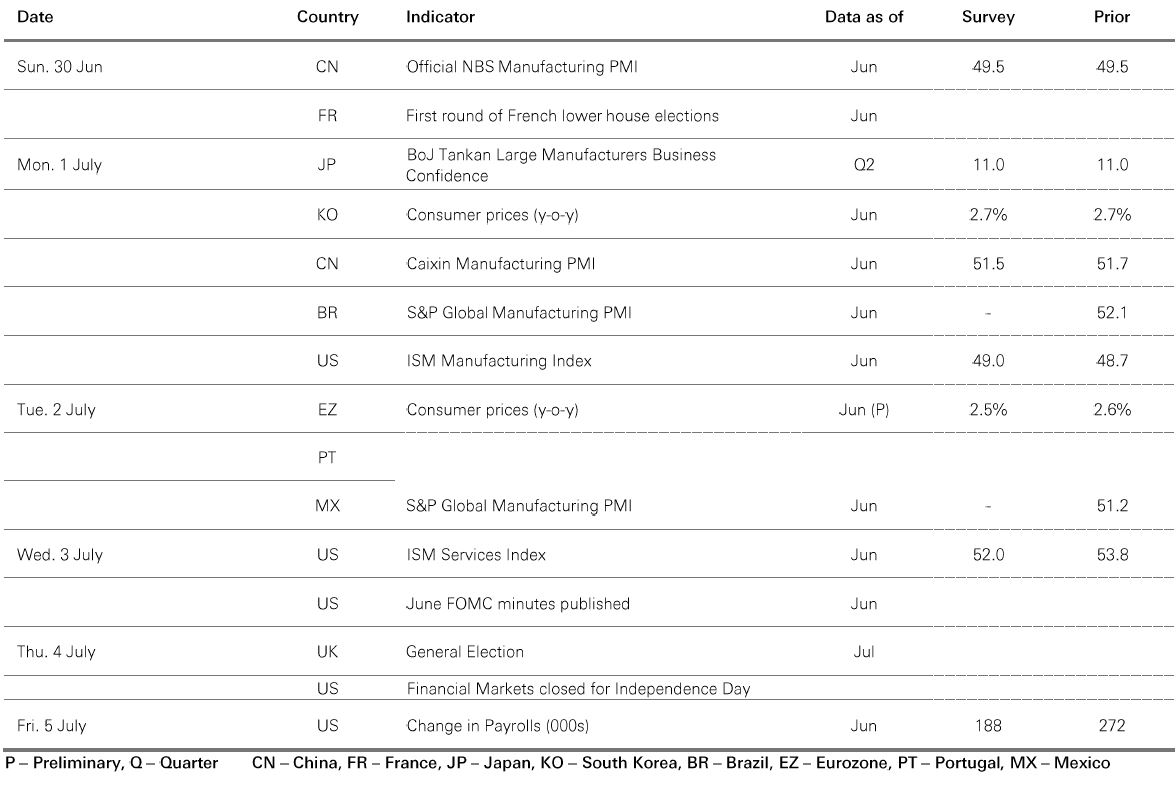
Source: HSBC Asset Management. Data as at 11am UK time 28 June 2024.
Risk assets struggled to make headway amid a quiet week for economic updates. Core government bonds consolidated as investors absorbed hawkish comments from Fed member Bowman and mixed US data. The latest inflation figures in Australia and Canada surprised on the upside. US equities were range-bound. The Euro Stoxx 50 index traded sideways ahead of the first round of French legislative elections, while the spread between 10yr French and 10yr German sovereign bonds widened. Japan’s Nikkei 225 index rallied as the yen weakened against the US dollar to new multi-decade lows, with JGB yields higher on rising rate concerns. In EM, the Shanghai Composite remained on the defensive ahead of the third plenum review in China. India’s Sensex reached another record high. In commodities, improving demand lifted oil prices amid ongoing geopolitical tensions. Gold and copper softened.
Related Insights


April’s improved US inflation data and a less hawkish Fed tone suggest that a Fed rate cut...[1 Jun]

Market expectations for Fed rate cuts have been on a roller-coaster ride, swinging from too...[23 May]

For its seventh consecutive meeting, the FOMC voted unanimously to leave the benchmark...[13 Jun]
This document or video is prepared by The Hongkong and Shanghai Banking Corporation Limited (‘HBAP’), 1 Queen’s Road Central, Hong Kong. HBAP is incorporated in Hong Kong and is part of the HSBC Group. This document or video is distributed and/or made available by HSBC Bank Canada (including one or more of its subsidiaries HSBC Investment Funds (Canada) Inc. (“HIFC”), HSBC Private Investment Counsel (Canada) Inc. (“HPIC”) and HSBC InvestDirect division of HSBC Securities (Canada) Inc. (“HIDC”)), HSBC Bank (China) Company Limited, HSBC Continental Europe, HBAP, HSBC Bank (Singapore) Limited, HSBC Bank Middle East Limited (UAE), HSBC UK Bank Plc, HSBC Bank Malaysia Berhad (198401015221 (127776-V))/HSBC Amanah Malaysia Berhad (20080100642 1 (807705-X)), HSBC Bank (Taiwan) Limited, HSBC Bank plc, Jersey Branch, HSBC Bank plc, Guernsey Branch, HSBC Bank plc in the Isle of Man, HSBC Continental Europe, Greece, The Hongkong and Shanghai Banking Corporation Limited, India (HSBC India), HSBC Bank (Vietnam) Limited, PT Bank HSBC Indonesia (HBID), HSBC Bank (Uruguay) S.A. (HSBC Uruguay is authorised and oversought by Banco Central del Uruguay), HBAP Sri Lanka Branch, The Hongkong and Shanghai Banking Corporation Limited – Philippine Branch, and HSBC FinTech Services (Shanghai) Company Limited (collectively, the “Distributors”) to their respective clients. This document or video is for general circulation and information purposes only.
The contents of this document or video may not be reproduced or further distributed to any person or entity, whether in whole or in part, for any purpose. This document or video must not be distributed in any jurisdiction where its distribution is unlawful. All non-authorised reproduction or use of this document or video will be the responsibility of the user and may lead to legal proceedings. The material contained in this document or video is for general information purposes only and does not constitute investment research or advice or a recommendation to buy or sell investments. Some of the statements contained in this document or video may be considered forward looking statements which provide current expectations or forecasts of future events. Such forward looking statements are not guarantees of future performance or events and involve risks and uncertainties. Actual results may differ materially from those described in such forward-looking statements as a result of various factors. HBAP and the Distributors do not undertake any obligation to update the forward-looking statements contained herein, or to update the reasons why actual results could differ from those projected in the forward-looking statements. This document or video has no contractual value and is not by any means intended as a solicitation, nor a recommendation for the purchase or sale of any financial instrument in any jurisdiction in which such an offer is not lawful. The views and opinions expressed are based on the HSBC Global Investment Committee at the time of preparation, and are subject to change at any time. These views may not necessarily indicate HSBC Asset Management‘s current portfolios’ composition. Individual portfolios managed by HSBC Asset Management primarily reflect individual clients’ objectives, risk preferences, time horizon, and market liquidity.
The value of investments and the income from them can go down as well as up and investors may not get back the amount originally invested. Past performance contained in this document or video is not a reliable indicator of future performance whilst any forecasts, projections and simulations contained herein should not be relied upon as an indication of future results. Where overseas investments are held the rate of currency exchange may cause the value of such investments to go down as well as up. Investments in emerging markets are by their nature higher risk and potentially more volatile than those inherent in some established markets. Economies in emerging markets generally are heavily dependent upon international trade and, accordingly, have been and may continue to be affected adversely by trade barriers, exchange controls, managed adjustments in relative currency values and other protectionist measures imposed or negotiated by the countries with which they trade. These economies also have been and may continue to be affected adversely by economic conditions in the countries in which they trade. Investments are subject to market risks, read all investment related documents carefully.
This document or video provides a high level overview of the recent economic environment and has been prepared for information purposes only. The views presented are those of HBAP and are based on HBAP’s global views and may not necessarily align with the Distributors’ local views. It has not been prepared in accordance with legal requirements designed to promote the independence of investment research and is not subject to any prohibition on dealing ahead of its dissemination. It is not intended to provide and should not be relied on for accounting, legal or tax advice. Before you make any investment decision, you may wish to consult an independent financial adviser. In the event that you choose not to seek advice from a financial adviser, you should carefully consider whether the investment product is suitable for you. You are advised to obtain appropriate professional advice where necessary.
The accuracy and/or completeness of any third party information obtained from sources which we believe to be reliable might have not been independently verified, hence Customer must seek from several sources prior to making investment decision.
Important Information about HSBC Global Asset Management (Canada) Limited (“AMCA”)
HSBC Asset Management is a group of companies, including AMCA, that are engaged in investment advisory and fund management activities, which are ultimately owned by HSBC Holdings plc. AMCA is a wholly owned subsidiary of, but separate entity from, HSBC Bank Canada.
Important Information about HSBC Investment Funds (Canada) Inc. (“HIFC”)
HIFC is the principal distributor of the HSBC Mutual Funds and offers the HSBC Mutual Funds and/or the HSBC Pooled Funds through the HSBC World Selection® Portfolio service. HIFC is a subsidiary of AMCA, and indirect subsidiary of HSBC Bank Canada, and provides its products and services in all provinces of Canada except Prince Edward Island. Mutual fund investments are subject to risks. Please read the Fund Facts before investing.
®World Selection is a registered trademark of HSBC Group Management Services Limited.
Important Information about HSBC Private Investment Counsel (Canada) Inc. (“HPIC”)
HPIC is a direct subsidiary of HSBC Bank Canada and provides services in all provinces of Canada except Prince Edward Island. The Private Investment Counsel service is a discretionary portfolio management service offered by HPIC. Under this discretionary service, assets of participating clients will be invested by HPIC or its delegated portfolio manager, AMCA, in securities, including but not limited to, stocks, bonds, mutual funds, pooled funds and derivatives. The value of an investment in or purchased as part of the Private Investment Counsel service may change frequently and past performance may not be repeated.
Important Information about HSBC InvestDirect (“HIDC”)
HIDC is a division of HSBC Securities (Canada) Inc., a direct subsidiary of, but separate entity from, HSBC Bank Canada. HIDC is an order execution only service. HIDC will not conduct suitability assessments of client account holdings or of the orders submitted by clients or from anyone authorized to trade on the client’s behalf. Clients have the sole responsibility for their investment decisions and securities transactions.
Important Information about the Hongkong and Shanghai Banking Corporation Limited, India (“HSBC India”)
HSBC India is a branch of The Hongkong and Shanghai Banking Corporation Limited. HSBC India is a distributor of mutual funds and referrer of investment products from third party entities registered and regulated in India. HSBC India does not distribute investment products to those persons who are either the citizens or residents of United States of America (USA), Canada, Australia or New Zealand or any other jurisdiction where such distribution would be contrary to law or regulation.
The following statement is only applicable to HSBC Bank (Taiwan) Limited with regard to how the publication is distributed to its customers: HSBC Bank (Taiwan) Limited (“the Bank”) shall fulfill the fiduciary duty act as a reasonable person once in exercising offering/conducting ordinary care in offering trust services/ business. However, the Bank disclaims any guarantee on the management or operation performance of the trust business.
The following statement is only applicable to PT Bank HSBC Indonesia (“HBID”): PT Bank HSBC Indonesia (“HBID”) is licensed and supervised by Indonesia Financial Services Authority (“OJK”). Customer must understand that historical performance does not guarantee future performance. Investment product that are offered in HBID is third party products, HBID is a selling agent for third party product such as Mutual Fund and Bonds. HBID and HSBC Group (HSBC Holdings Plc and its subsidiaries and associates company or any of its branches) does not guarantee the underlying investment, principal or return on customer investment. Investment in Mutual Funds and Bonds is not covered by the deposit insurance program of the Indonesian Deposit Insurance Corporation (LPS).
THE CONTENTS OF THIS DOCUMENT OR VIDEO HAVE NOT BEEN REVIEWED BY ANY REGULATORY AUTHORITY IN HONG KONG OR ANY OTHER JURISDICTION.
YOU ARE ADVISED TO EXERCISE CAUTION IN RELATION TO THE INVESTMENT AND THIS DOCUMENT OR VIDEO. IF YOU ARE IN DOUBT ABOUT ANY OF THE CONTENTS OF THIS DOCUMENT OR VIDEO, YOU SHOULD OBTAIN INDEPENDENT PROFESSIONAL ADVICE.
© Copyright 2024. The Hongkong and Shanghai Banking Corporation Limited, ALL RIGHTS RESERVED.
No part of this document or video may be reproduced, stored in a retrieval system, or transmitted, on any form or by any means, electronic, mechanical, photocopying, recording or otherwise, without the prior written permission of The Hongkong and Shanghai Banking Corporation Limited.
Important information on sustainable investing
“Sustainable investments” include investment approaches or instruments which consider environmental, social, governance and/or other sustainability factors (collectively, “sustainability”) to varying degrees. Certain instruments we include within this category may be in the process of changing to deliver sustainability outcomes.
There is no guarantee that sustainable investments will produce returns similar to those which don’t consider these factors. Sustainable investments may diverge from traditional market benchmarks.
In addition, there is no standard definition of, or measurement criteria for sustainable investments, or the impact of sustainable investments (“sustainability impact”). Sustainable investment and sustainability impact measurement criteria are (a) highly subjective and (b) may vary significantly across and within sectors.
HSBC may rely on measurement criteria devised and/or reported by third party providers or issuers. HSBC does not always conduct its own specific due diligence in relation to measurement criteria. There is no guarantee: (a) that the nature of the sustainability impact or measurement criteria of an investment will be aligned with any particular investor’s sustainability goals; or (b) that the stated level or target level of sustainability impact will be achieved.
Sustainable investing is an evolving area and new regulations may come into effect which may affect how an investment is categorised or labelled. An investment which is considered to fulfil sustainable criteria today may not meet those criteria at some point in the future.